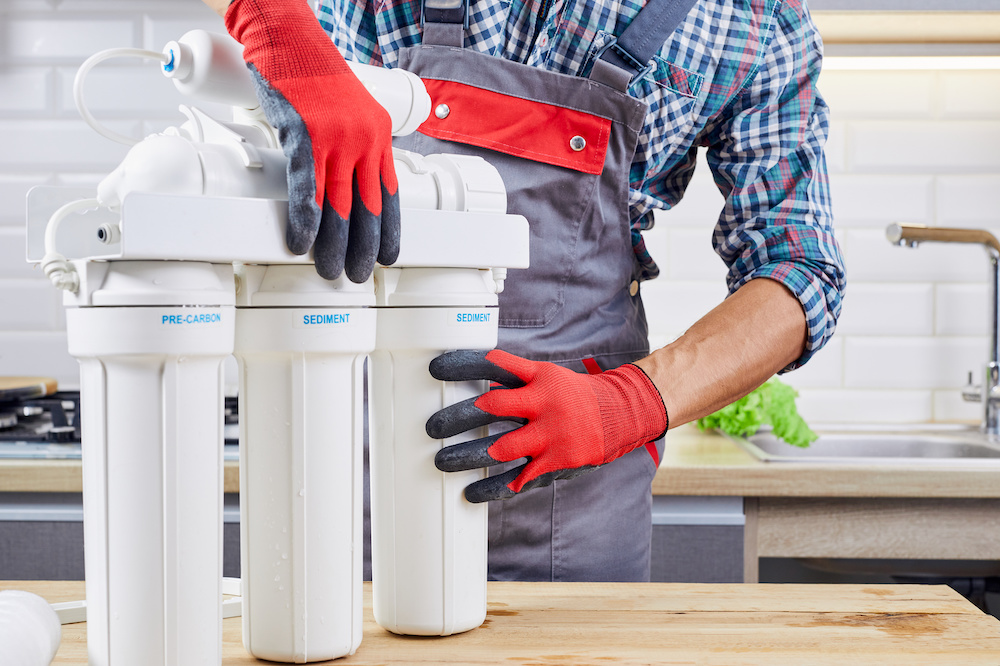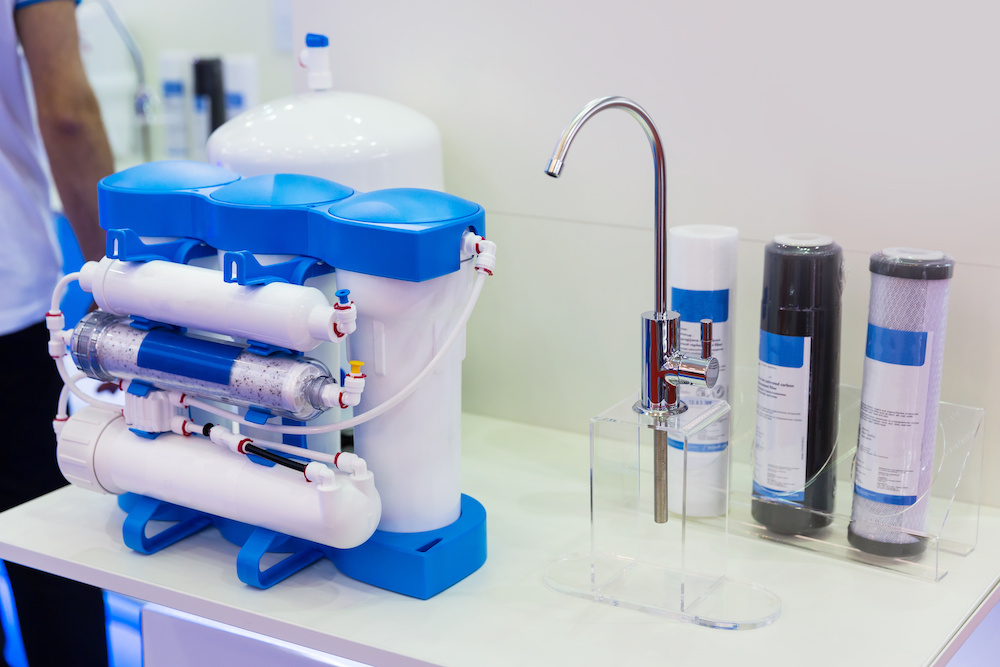Knowing the pH of your drinking water is essential, especially since having an imbalanced pH can impact your health and water system.
After all, your home pipes and appliances can suffer from too much alkalinity or acidity.
Reverse osmosis is a popular water filtration method, so naturally many people wonder, is reverse osmosis water alkaline?
Today, we’ll answer that question and discuss what reverse osmosis is and whether reverse osmosis water is the right choice for your family.
What Is Reverse Osmosis?
Before we talk about the reverse osmosis system, we believe that it would be helpful to understand osmosis first.
Osmosis is one of the most crucial natural processes. It is a phenomenon that allows a weaker saline solution to migrate to a stronger one through a semipermeable membrane.
With osmosis, the human body can absorb nutrients and eliminate toxins.
As the name suggests, reverse osmosis is the opposite of this process. Instead of having it naturally occurring, reverse osmosis happens with the use of a high-pressure pump.
Also, rather than transferring from a lower saline solution to a higher saline solution, you’ll have the higher saline solution push through a semipermeable membrane and demineralized.
Is Reverse Osmosis Water Alkaline?
So, is reverse osmosis water alkaline? No, it’s not.
Reverse osmosis allows pure water to be created. Pure water has a pH level of seven, so technically, it isn’t acidic yet.
However, in time, the pH level of pure water eventually drops to 5.5 or even lower.
It gradually becomes acidic. If you wish to alkalize reverse osmosis water, you must remineralize it with alkaline minerals, such as calcium and sodium.
Don’t worry. We’ll share a more detailed process of alkalizing reverse osmosis water.
For now, let’s talk about how this water filtration method results in acidic water.
Why Is Reverse Osmosis Water Acidic?
RO water is more acidic due to its efficiency in purifying water. The semipermeable membrane of reverse osmosis systems can usually clear 95 to 99% of contaminants.
As aforementioned, reverse osmosis water isn’t automatically acidic. That said, it produces pure water that readily absorbs carbon dioxide from the air.
Pure water plus carbon dioxide results in carbonic acid. Here’s the formula:
- H2O + CO2 = H2CO3
The more pure your water is, the more carbon dioxide it will absorb once exposed to air and the more acidic it becomes.
The entire process can take about an hour of exposure before your pure water becomes acidic.
In addition, keep in mind that natural water is never pure because of its constant exposure to various minerals.
You can say that nature has its way of keeping drinking water acidic; in fact, our air quality can impact how acidic pure water can get.
According to the National Oceanic and Atmospheric Administration, the increasing levels of carbon dioxide in our air result in the acidification of our natural bodies of water. These include our lakes, rivers, and oceans.
How to Make Reverse Osmosis Water Alkaline
The main reason RO water is acidic is that it has been stripped of its minerals. Thus, an effective solution to make it more alkaline is to reintroduce minerals back to it.
This way, you’ll be able to choose which minerals will be in your drinking water instead of relying solely on nature or on your municipal water supplier.
Let’s not forget that an excessive level of minerals in our drinking water isn’t healthy either.
The good news is that the number of RO systems designed with remineralization features is steadily increasing.
We recommend you check out these water filtration systems if you don’t own a reverse osmosis system yet.
If you already have an RO, you can also add a remineralization cartridge to an existing system. This option is more affordable compared to getting a new and complete system.
Regardless, it is still wise to test your water’s pH before doing so. This way, you can ensure that remineralization is actually needed.
Then, once you install your new cartridge, we highly recommend checking for the second time. You’ll want to know whether your additional system is working or not.
Many remineralization cartridges last for around six months before they need replacement.
However, the accurate answer will still depend on several factors, including your chosen brand, model, and volume of water consumption.
Finally, you may also use a water ionizer. However, remember that you’ll still have to remineralize your water first.
Water ionizers usually require a certain level of minerals for them to work.
Don’t worry. The extra effort will be worth it, especially if you want to enjoy full control over your water’s pH levels. After all, water ionizers give you a wider pH range.

Is Reverse Osmosis Water Bad for You?
Now that we have a good grasp of how reverse osmosis works and why it yields acidic water, we can move on to the next question: is reverse osmosis water unfit for drinking?
Will it pose a threat to your health if you don’t get your water remineralized? It depends.
According to the National Secondary Drinking Water Regulations by the United States Environmental Protection Agency, water with pH levels ranging from 6.5 to 8.5 is safe to consume.
Hence, you should only worry if it falls beyond this range. Otherwise, it is safe to drink.
Reverse Osmosis Water Benefits
Are you still not sure whether reverse osmosis is right for you? Here are some of the benefits to consider:
- Can Give You Peace of Mind
Reverse osmosis can free your water of contaminants such as mercury or lead.
This is especially crucial if you live near an industrial site where such pollutants can easily seep through underground water systems.
- Energy Efficient
Other water cleaning systems, such as distillation, require heat and electricity.
Meanwhile, the only thing that reverse osmosis requires is water pressure.
- Food Can Taste Better
Minerals and other impurities can impact the flavor of your food.
Reverse osmosis can help ensure that your food will taste as you have intended it to.
Reverse Osmosis Water Downsides
As with other water filtration systems, reverse osmosis also has its own set of disadvantages, like the following:
- Can Be Costly
Indeed, a reverse osmosis system won’t require a lot of utilities.
However, it is still worth mentioning that it will require installation and regular maintenance, which can be a little pricy if you don’t do it yourself.
- Produces Wastewater
For us, one of the biggest disadvantages of the reverse osmosis method is that it produces wasted water.
- More Acidic
Lastly, as we have already mentioned, the pure water that the reverse osmosis process produces can instantly become acidic when exposed to air.
To answer the main question: no, reverse osmosis water isn’t bad for you, but it does have its downsides.
It’s ideal to check your water’s pH levels and ensure that it remains within the range we have featured above.
Is Alkaline Water Better for One’s Health?
Here’s a question that many of our readers ask: if the pH levels of your reverse osmosis water are within the healthy range, do you still have to remineralize it? Is it worth the extra effort?
According to the Annals of Otology, Rhinology, and Laryngology, drinking alkaline water with a pH of 8.8 can help treat acid reflux.
That is due to its ability to deactivate pepsin, the enzyme that causes reflux.
Another study found that alkaline water may assist in having a more regular and healthy bowel movement.
The study was conducted using an alkaline electrolyzed water (or AEW) apparatus, a piece of medical equipment approved in Japan.
After a month of drinking AEW water regularly, the participants didn’t just feel relief from gastrointestinal issues, but they also reported increased sleep quality.
Other health benefits are also attributed to drinking alkaline water regularly, including:
- Weight loss
- Increased immunity against diseases
- Detoxification
- Cancer resistance
However, according to Katherine Zeratsky, a registered dietitian, further studies are still needed to provide substantial proof that alkaline water can yield long-term benefits.
In the end, that health decision would be up to you.
Is There a Downside to Drinking Alkaline Water?
Alkaline water is generally considered safe for drinking. Science has yet to reveal any adverse side effects of alkaline water on your health.
However, some references caution people about the possible changes the body may undergo if you frequently drink water with a different pH level than regular tap.
For instance, it may trigger our digestive system to produce hydrochloric acid to regulate the body’s pH levels and get back to that state of homeostasis.
To be safe, it’s best to consult your physician before you make significant changes to your diet, such as switching to alkaline water.
Where Can You Get Alkaline Water?
You can buy bottled alkaline water from popular grocery chains and health stores. You will also find other viable sources online.
There are also ways to prepare your own alkaline water at home. Some people add pH drops or baking soda to make their water more alkaline.
We have already shared the process of making reverse osmosis water alkaline above. Feel free to use these methods as well.
Making Your Reverse Osmosis Water Alkaline
Are you asking, “Is reverse osmosis water alkaline?”
The answer is it’s not. It starts out neutral and quickly becomes acidic, but there are ways to make it alkaline.
Don’t forget that there are benefits to drinking reverse osmosis too.
We conclude that you don’t really have to choose. It is possible to get the best of both worlds.
You can invest in a quality reverse osmosis system. This way, you can ensure that your family is drinking clean water.
You may remineralize and ionize the produced water to achieve the ideal pH level our body requires, which is not too acidic yet not too alkaline.

